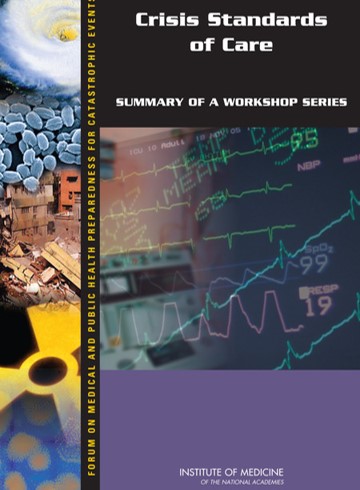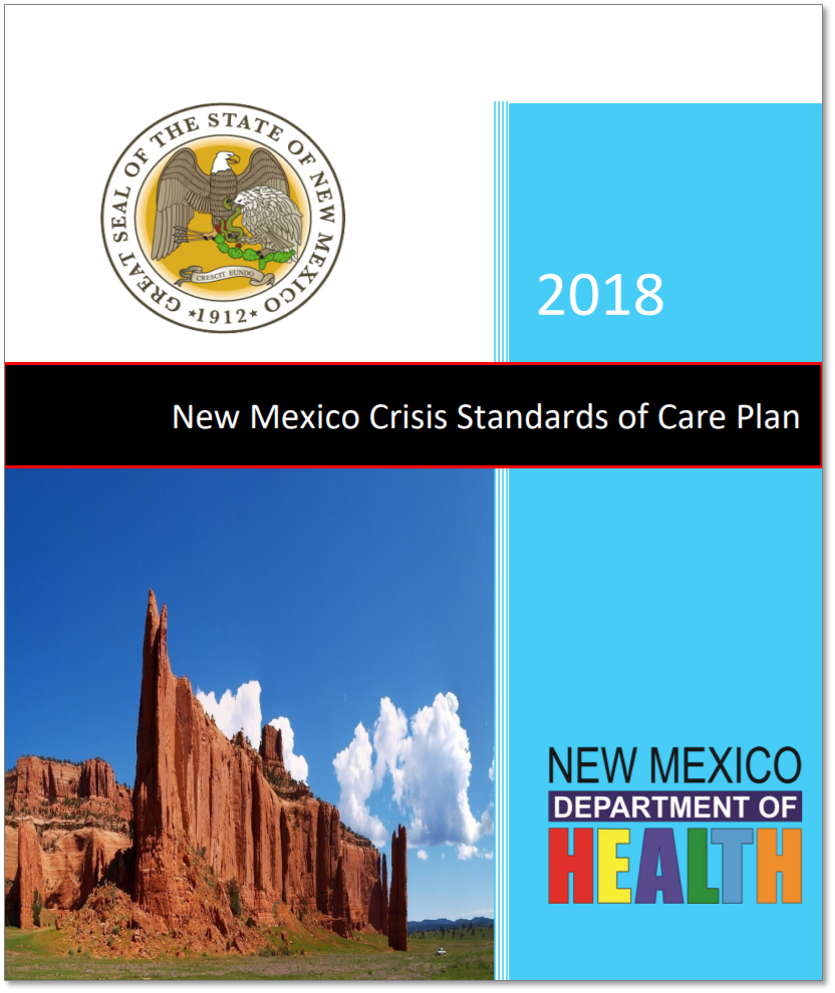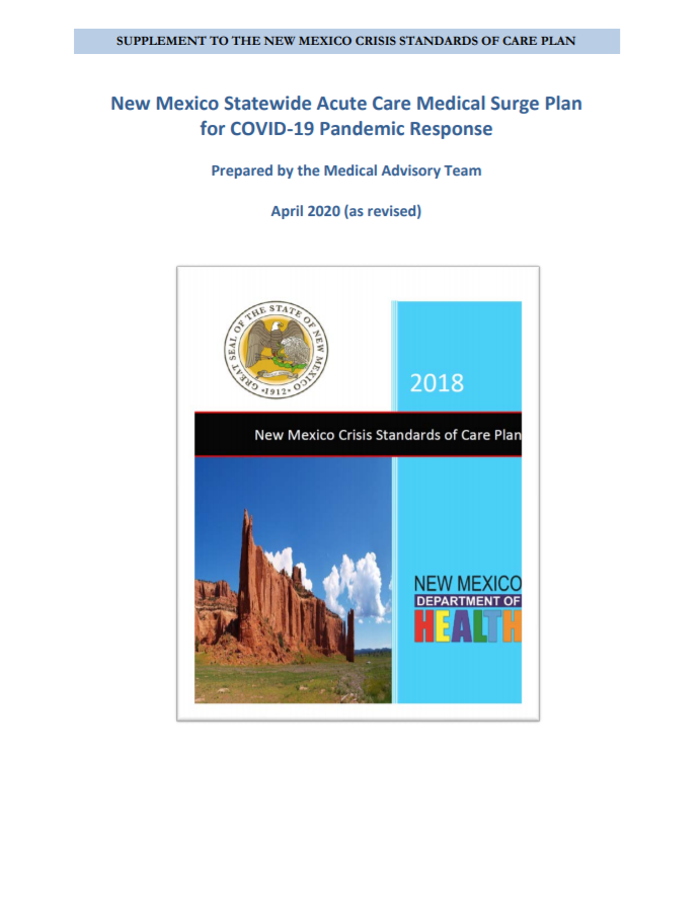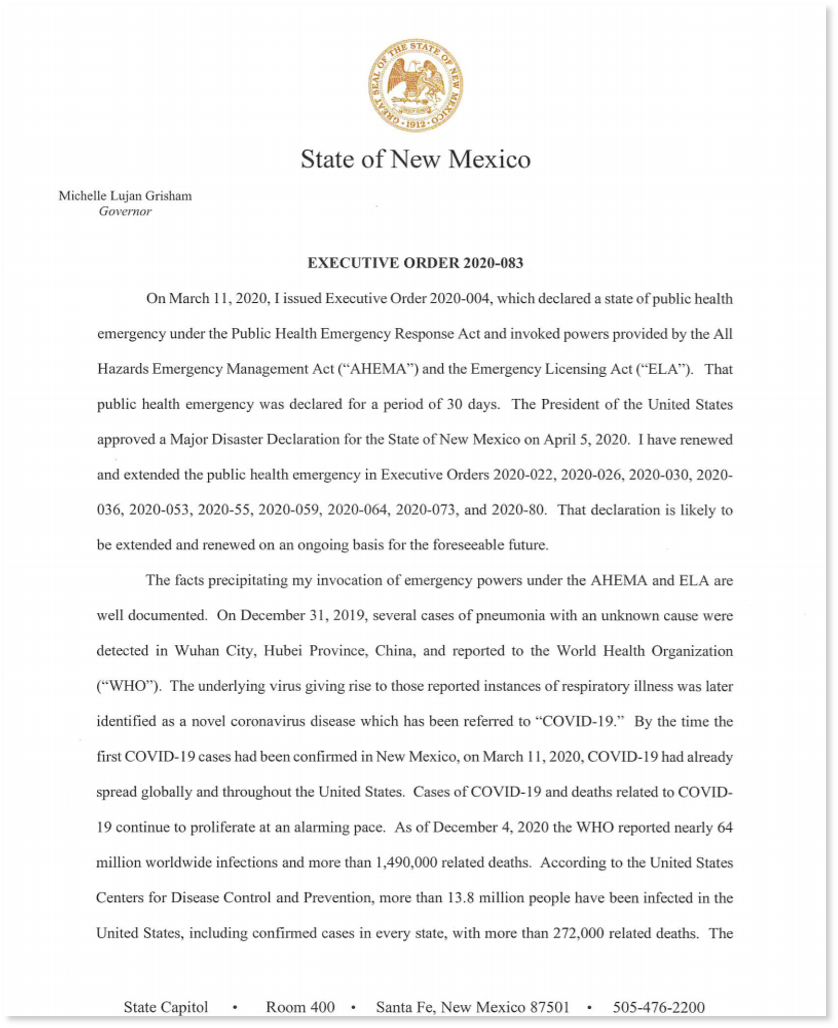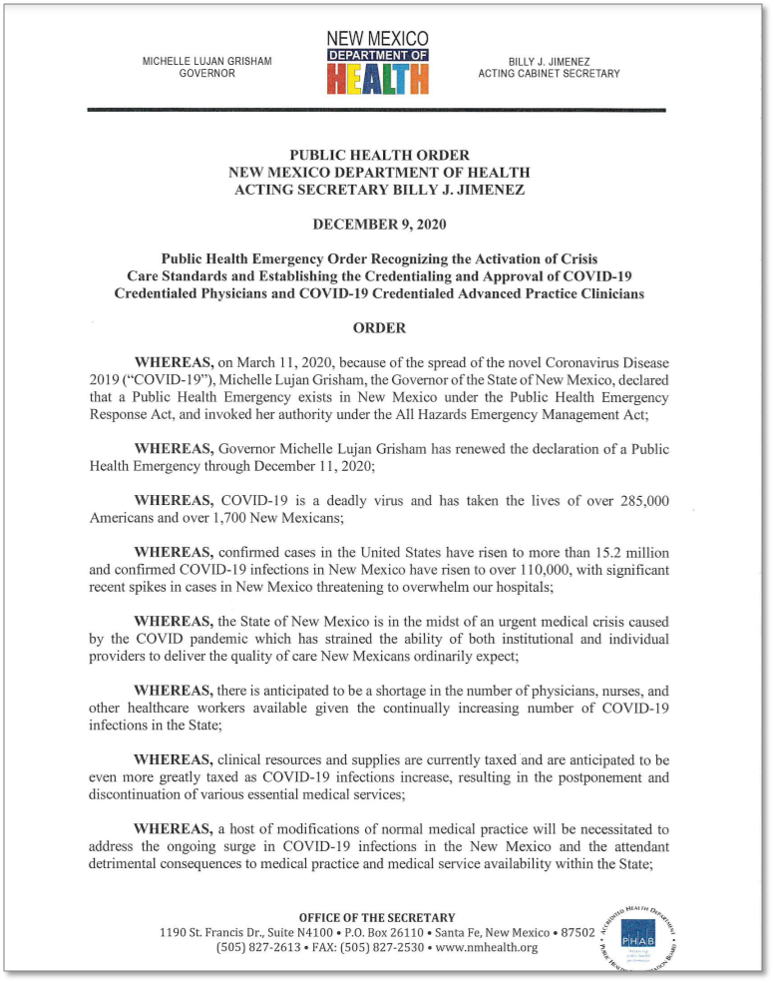Healthcare Workforce Expansion & Protections during COVID-19 Public Health Emergency
Note: The information contained on this page is for archival purposes only and it is no longer maintained or updated.
Key Documents
The MAT relies on national standards and exisiting practices, amending them to meet the specific needs of New Mexico when appropriate. For example, the U.S. Institute of Medicine (IOM) has outlined a framework for public health emergency and/or disaster response by identifying existing state, local, and federal practices, policies and protocols for Crisis Standards of Care. The IOM guidance also describes barriers to increased provider and community engagement and provides examples of existing interstate collaborations.
Supplementing the IOM’s foundational document is the New Mexico Crisis Standards of Care Plan published by the DOH. It describes the State’s approach for a Public Health Emergency response using IOM principles, establishes the MAT, and addresses ethical issues of scarcity.
To supplement the NM Plan, the MAT developed the 2020 Acute Care Medical Surge Plan for COVID-19. This document outlines the State response structure to the COVID-19 pandemic, including MAT Workgroups, regional care coordination (e.g. Hub and Spoke Model), hospital capacity considerations, and clinical care guidance. It also includes the New Mexico Triage Protocol for the Allocation of Scarce Resources Under COVID-19 Crisis Standards of Care, which describes a consistent way in which providers must triage COVID-19 patients when there are inadequate healthcare resources.
As the number of cases and hospitalizations rose in November and December, the MAT formally requested the DOH to activate Crisis Standards of Care. This request reflects healthcare providers concerns about their protections given the extraordinary demands of treating New Mexicans with and without COVID-19 during this heightened medical surge. Further, if Crisis Standards of Care are implemented, healthcare professionals will be asked to assist in additional areas outside their scope of practice and to provide support with the treatment and care of those infected with COVID-19 and to stretch limited resources beyond usual and customary practice.
On December 4, the governor signed Executive Order 2020-083, which provides for temporary facilitation of any assistance that may become necessary outside providers’ regular scope of practice and support. This Executive Order was followed by a Public Health Order on December 9, formally activating Crisis Standards of Care and establishing the credentialing and approval of COVID-19 Physicians and Advanced Practice Clinicians.
NM Healthcare Licensure Boards Actions
Identifying ways to increase healthcare workforce capacity throughout the State during the COVID-19 pandemic is paramount. Several healthcare licensure boards have taken actions to clarify rules and regulations governing the scope of practice for providers during the Public Health Emergency (PHE), including occasions when providers may be asked to serve outside normal and customary clinical privileges. A summary of board actions is below, more information can be found at the links below.
On December 3, 2020, the NM Medical Board approved:
Board Resolution stating that for the duration of the PHE, it shall not be considered a violation of any applicable rule or regulation governing the scope of practice for physicians and surgeons, physicians assistants, anesthesia assistants and physician pharmacist clinician supervisors for unprofessional conduct, for the organized medical staff, acting by and through its medical staff executive committee, to authorize and direct the physicians and surgeons, physicians assistants and anesthesia assistants, and physician pharmacist clinician supervisors to serve as COVID-19 Providers and provide health care services to all patients of the hospital where they serve even though the provision of those services may be outside the normal and customary clinical privileges granted to each such COVID-19 Provider…. To the extent that the persons and healthcare facilities designated or listed as “COVID-19 Providers” adopt or implement the Crisis Standards of Care, such Crisis Standards of Care can and should be considered by the providers and healthcare facilities designated as “COVID-19 Providers” as “generally accepted health-care standards.
On December 8, 2020, the NM Board of Pharmacy approved:
- Board Resolution to allow pharmacists and pharmacist clinicians to provide care for hospitalized patients within the scope of practice for their license during the declared public health emergency due to COVID-19.
- Pharmacist Clinician protocol for treatment of hospitalized patients during the declared public health emergency due to COVID-19 A pharmacist clinician with an existing license may submit the protocol and be granted temporary approval to practice under the protocol.
- A UNM request whereby pharmacist interns may administer COVID-19 vaccine under the supervision of a physician or nurse practitioner (UNM vaccine clinics), when a pharmacist preceptor is not available.
On December 10, 2020, the NM Board of Nursing approved:
Board Resolution stating that for the duration of the PHE, it shall not be considered a violation of any applicable rule or regulation governing the scope of practice for nursing or unprofessional conduct for the organized health care staff, acting by and through its medical staff executive committee, to authorize and direct the certified nurse practitioners, certified registered nurse anesthetists, clinical nurse specialists, registered nurses, and licensed practical nurses to serve as COVID-19 providers and provide health care services to all patients of the hospital where they serve even though the provision of those services may be outside of each such COVID-19 provider’s normal practice or customary clinical privileges…. To extent that the persons and health facilities designated or listed as “COVID-19 providers” determine to adopt or implement the Crisis Standards of Care, such Crisis Standards of Care can and should be considered by such providers and health facilities designated as COVID-19 providers as “generally accepted healthcare standards” for purposes of the New Mexico Uniform Health-Care Decisions Act, NMSA 1978, Sections 24-7A-9 & 24-7A-13D.
On December 14, 2020, the NM Board of Osteopathic Medicine approved:
Board Resolution stating that for the duration of the PHE, it shall not be considered a violation of any applicable rule or regulation governing the scope of practice for osteopathic doctors or unprofessional conduct, for the organized medical staff, acting by and through its medical staff executive committee, to authorize and direct the osteopathic doctors to serve as COVID-19 Credentialed Physicians, as defined by Executive Order 2020-083, and provide health care services to all patients of the hospital where they serve even though the provision of those services may be outside the normal and customary clinical privileges granted to each such COVID-19 Credentialed Physician…. To extent that persons and health facilities designated or listed as “COVID-19 Credentialed Physicians” determine to adopt or implement the Crisis Standards of Care, such Crisis Standards of Care can and should be considered by such providers and health facilities designated as “COVID-19 Credentialed Physicians” as “generally accepted health-care standards” for purposes of the New Mexico Uniform Health-Care Decisions Act, NMSA 1978, §§ 24-7A-9 & 24-7A-13D.
NM Office of Superintendent of Insurance Actions
- December 4, 2020 Bulletin 2020-023 to every authorized insurer selling commercial insurance in NM placing a moratorium on the filing of commercial insurance forms that include COVID-19 related changes pending the conclusion of the 2021 legislative session.
- December 4, 2020 Notice to insurers providing coverage under the NM Medical Malpractice Act’s Patient’s Compensation Fund that until further notice, and in accordance with Section 41-5-26 NMSA 1978, no such policy shall exclude, limit or modify claims against any qualified healthcare provider arising from the diagnosis, misdiagnosis, failure to diagnose, treatment, or failure to treat COVID-19. Additionally, no such insurer shall deny malpractice coverage for a qualified provider who performs medical services in a different specialty rating as a result of COVID-19 exigencies or health care provider shortages.
- December 4, 2020 Notice to health insurance carriers informing them that physicians and other clinicians caring for COVID-19 patients should be promptly and accurately reimbursed, even if they are not practicing in their areas of specialization or in their normal places of service.
Copyright New Mexico Department of Health

